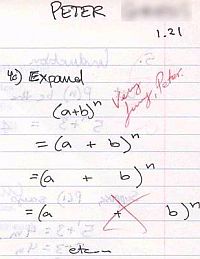|
Men of
Mathematics - E. T. Bell
|
 I
remember (There I go again!) reading in Time magazine
a long time ago that one of their fundamental editorial principles was
to always put the spotlight on the people in an article, no matter
what the subject was. For instance, an account of recent progress in
the Fight Against Cancer, or a piece on Global Warming, should not relegate
the experts to the role of just providing factual information: the experts
should be the principal actors of the drama; their emotions, accomplishments,
setbacks and hopes should constitute "the meat" of the story.
I
remember (There I go again!) reading in Time magazine
a long time ago that one of their fundamental editorial principles was
to always put the spotlight on the people in an article, no matter
what the subject was. For instance, an account of recent progress in
the Fight Against Cancer, or a piece on Global Warming, should not relegate
the experts to the role of just providing factual information: the experts
should be the principal actors of the drama; their emotions, accomplishments,
setbacks and hopes should constitute "the meat" of the story.
I think that this is excellent advice. The human aspect adds a dimension to any story: adding interest, capturing attention, facilitating retention. Just take my favorite hobby, the game of chess. Granted, even a dull compilation of master games, properly commented, would catch my interest, but my enjoyment will be markedly increased when I know that the players hated each other's guts, or that one player was a rising teenager while the other was a seasoned grandmaster, or that one of the players was in severe time pressure, or that he had to win the game to become the new World Champion.
This view is somewhat contrary to the present tendency to play down the role of individuals in history. E. G. Geijer famously (in Sweden!) wrote: "Sweden's history is that of its kings." Such a statement does not impress modern historians, who prefer to think in terms of social groups and political ideologies in a commendable attempt to make sense of history, and to see it as something more than "one damn thing after another". They may have a point, but they may also risk losing their audience in the process.
 |
|
Men of Mathematics mirrors the development of mathematics in the form of some 25 biographies of prominent mathematicians, from the ancient Greeks to Georg Cantor. The book has served generations of young students as an introduction to the cultural history of mathematics. But it was written in 1937, so the past century is hardly represented at all.
The author Eric Temple Bell (1883-1960) was himself a competent mathematician, but his main claim to fame is as a mathematics historian. He also wrote science fiction (published under the pseudonym John Taine) and poetry. He was born in Scotland but spent most of his life in the U.S.A. (University of Washington in Seattle and CalTech in Pasadena).
On re-reading his book after 50 years, it is easy to see why I found it irresistible. It is exceptionally well written (and translated). It does not delve deeply into mathematics - it is well within the range of any bright high school student - yet it gives enough solid information and background to enable the reader to appreciate what the mathematicians were trying to achieve. Descartes' analytical geometry, Fermat's works, Leibniz's and Newtons's development of the calculus, the 19th century debate about the foundations of mathematics are all described in an intelligible way. What really sets it apart are the riveting stories of the lives of the great mathematicians: their background, their work, their discoveries, their struggle for recognition.
 |
|
E. T. Bell (1883-1960)
|
Bell's gifts as a raconteur have earned him some critics among professional historians, who question his accuracy when it comes to detail. - Did Galois really feverishly write down all of his mathematical achievements during the night before the duel that he knew was going to end his life at 20? - Is the account of Descartes' travails at Queen Christina's court in Stockholm accurate in every respect? - When Gauss was 9 or 10 years old, his math teacher wanted some quiet, so the class was assigned the task of adding all numbers between 1 and 100. Gauss finished it in seconds, while his classmates toiled away. According to Bell, Gauss proudly told the story all his life: he had been the only one to come up with the correct answer. - True or not? Who cares, the point is that the story is credible and says something about Gauss' natural aptitude for mathematics.
But I should not give the impression that the book is a collection of anecdotes. Far from it. It is a book that makes mathematicians long gone come to life, and it shows how their accomplishments fit into history - not just the history of mathematics, but also more generally into the history of science and the history of European culture.